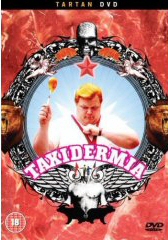
(a.k.a. TAXIDERMIE; TAXIDERMIA - DER AUSSTOPFER)
TAXIDERMIA drags us through specific moments in the lives of three Hungarian males, each representing a different generation of the same family.
It starts with life on a remote farmhouse during the second world war, where Morosgovanyi (Csaba Czene, MIRAQ) lives as an orderly with his Lieutenant and his family. The Lieutenant keeps Morosgovanyi in line by developing a rigid daily routine that he must not only adhere to, but bark aloud to remind himself of what must be done - bathe regularly, tend to the pigs, etc.
But when Morosgovanyi is not preoccupied by such chores, his mind tends to wander. He has a fascination with fire, particularly candles - and at one point imagines his penis is capable of emitting huge flames.
More worryingly, he's sexually frustrated. Which leads to a fairytale-like fantasy of a paedophilic nature, and an equally disturbing sexual encounter that sires a son ...
The son, born with a piglet's tail, is Kalman (Gergely Trocsanyi). He grows up to be a professional speed-eater - a sport televised live as big fat men trough food by the barrel-load, occasionally stopping to vomit and allow room for more food.
Kalman loses his latest competition, much to his coach Jeno's dismay. The reason behind Kalman's lapse in concentration is the female speed-eating champion, Gizi (Adel Stanczel). She falls for Kalman when he becomes ill, and later they marry.
But there are ups and downs in Kalman and Gizi's relationship (starting with his speed-eating rival Bela banging the bride on her wedding day), before all works out well and they have their own child - the diminutive Lajos.
Lajos (Marc Bischoff, GOOD BYE LENIN!) grows up to be a pale-faced, painfully thin taxidermist. He divides his time between stuffing animal carcasses for a living, unsuccessfully asking out a cashier at the local supermarket and going round his Dad's house to feed his oversized cats. And, my, how Dad has grown - Kalman is freakishly obese by this point, his only pleasures in life being cursing the speed-eaters performing on his TV, berating Lajos and cooing after his mutant cats.
It's a bizarre life, certainly ... and it's only going to get weirder as Lajos prepares to transform his body into a work of art ...
TAXIDERMIA is an accomplished and assured second feature from Gyorgy Palfi, following the celebrated HUKKLE. Visually, it's bold and often dazzling, mixing grandiose set design and vivid colour schemes with ambitious camera-work and some truly shocking imagery.
But, as shocking as the movie is - with it's copious (fake) vomiting, obligatory cum shot, explicit sexual intercourse and close-ups of dead animals being carved up - it's testament to Palfi that this is also a frequently beautiful proposition. Often dreamlike in its meticulously crafted compositions, TAXIDERMIA plays like Terry Gilliam's darkest, most perverted nightmares.
Thematically, the film tackles writer Lajos Parti Nagy's short stories (he also has a supporting role in TAXIDERMIA), and plays upon the universal obsession with our own bodies.
Mortality, size (whether obesity or being small - Kalman resigns to love his baby anyway, when he discovers it was born underweight), food, bodily fluids (urine, semen, vomit, sweat - they all feature in key observations) and our fundamental relationship with animals - mostly illustrated as carnal desire here - all dominate each set-piece.
TAXIDERMIA can also be seen as an ode to excess, again tackling the obsession we have with controlling our own bodies. The movie flaunts at this value, ramming bestiality, wanton lust, gluttony, drunkenness and manic exercising into the mix. Even the vulgar language of the Lieutenant is exaggerated to excess.
Tellingly, for a film that contemplates excess and suggests we are all driven by desire from within - greed, if you will - the film ends with zoom into a character's belly button.
Away from the theme, it must be said TAXIDERMIA has an interesting sound design. It's original and quirky, and complements the striking visuals superbly.
Made with brains and guts at the forefront, with spirited performances from an extremely "up for it" cast, TAXIDERMIA is a grand looking, conceptually bold and graphic surrealist piece, the likes of which can draw favourable comparison to Dusan Makavejev's SWEET MOVIE. Not since the 1970s has such uncompromising material been given such a rich delivery.
On a negative point, the film's darkly comic approach to its subjects prevents it from ever becoming emotionally engaging. This is a shame as the only thing TAXIDERMIA really lacks is a punch.
Tartan's disc offers the film fully uncensored in it's original 2.35:1 aspect ratio, anamorphically enhanced for 16x9 TV sets.
It's a fairly solid transfer, with good colour contrasts and sharp images throughout. There was a little motion blurring towards the start, but things soon sorted themselves out.
Audio-wise, the disc offers belting mixes in 2.0, 5.1 and 5.1 DTS. The film is presented in its original Hungarian audio with optional English subtitles.
An attractive animated main menu page leads into other static menu pages, including a scene-selection menu that allows access to the main feature via 16 chapters.
The only extra on offer is a 2-minute trailer, in anamorphic 2.35:1. The trailer has English and Hungarian audio, and forced English subtitles.
A Making Of documentary is advertised on the back cover of the DVD, but sadly it's not present. Tartan have done this before - I hope this stops in future, as not only is it frustrating but misleading and tantamount to false advertising.
Anyhow, the film is what matters, and TAXIDERMIA is a challenging yet rewarding experience, the likes of which are all too rare these days. Recommended viewing.
Review by Stu Willis
| Released by Tartan |
| Region 2 - PAL |
| Rated 18 |
| Extras : |
| see main review |